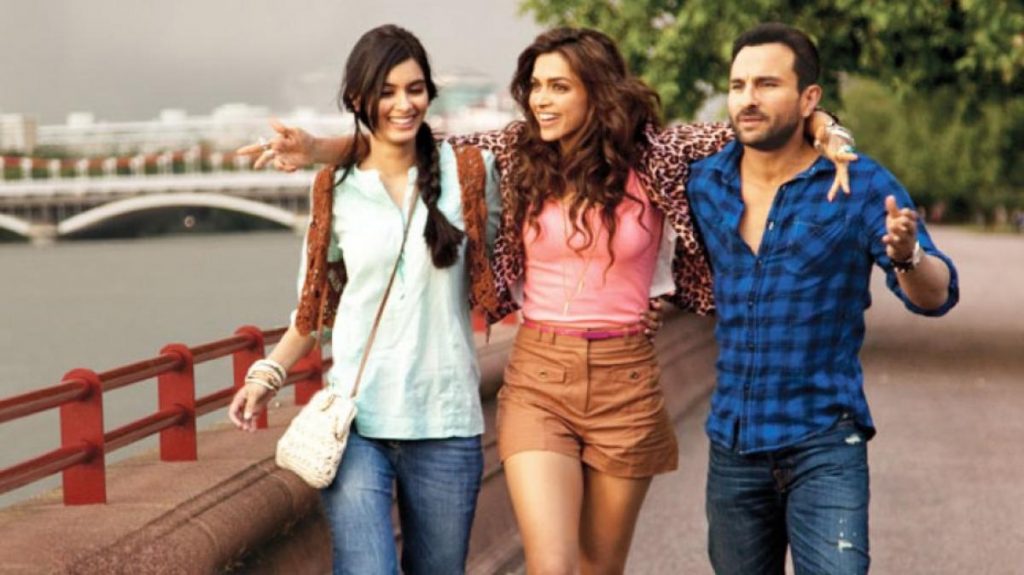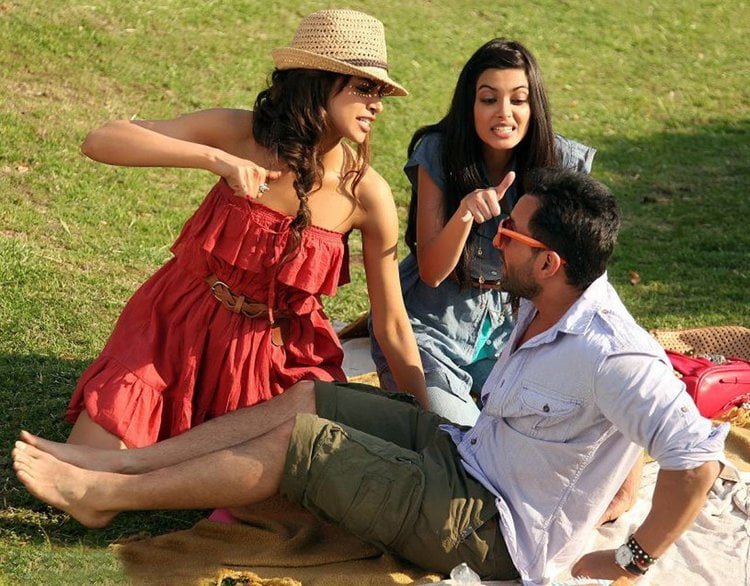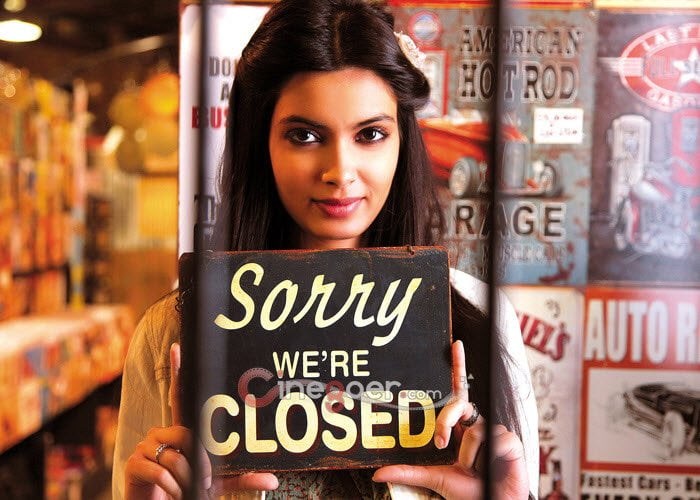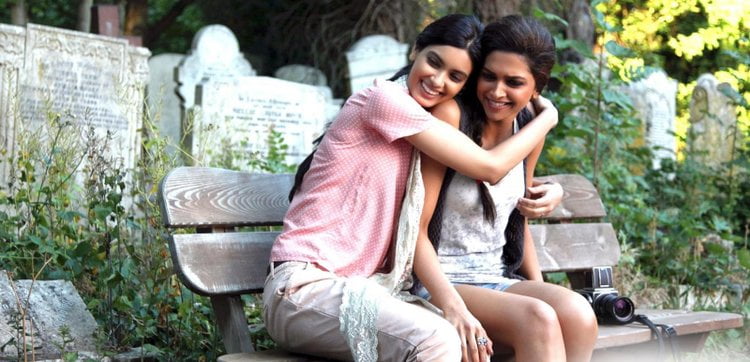Posted By Jaya Dubey
Starring: Deepika Padukone, Diana Penty, Saif Ali Khan
Plot: Boy meets girls. Girls fall for the boy. Duh.
It’s no wonder women across the world are missing their friends as they are confined to a new patriarchal COVID cage. Whatsapp and Zoom have helped a smidge, but the fret and fatigue are deep. This is especially poignant for Indian women. My mother’s generation probably left their school and college friends behind after marriage (she got married in 1969). Their only friends today may be neighbours or the wives of husbands’ friends, and those bonds may not be particularly close or personal.
Those of us privileged enough to continue childhood and adulthood friendships are now feeling what life was like for our mothers and foremothers—very little to no contact with best friends. No more non-male safe spaces. No belly laughs, mentoring, recipe-sharing, and hugs. Just when so many women were discovering lives beyond the home and developing intense female bonds, the Coronavirus came barreling along to slap us upside the head and effectively put us in our “rightful” place. For those of us who come from generations of moms unable to hang on to their school and college friends, 21st-century Bollywood’s message is no better: it tells us that female bonds are irrelevant and mere plot devices to fluff male egos. Meanwhile male friendships in Hindi films make out like bandits.
Cocktail. The title says it all. Add two women and stir. Of course, the film’s made by, for, and of men. Did you expect any different? Shame on you. Female Gaze? Bechdel test? Haha, stop it. That’s so last century.
So why am I bringing up a film from 2012 in 2020? Because as I watched, I started to miss my friends like mad. As I watched more, I wondered: Does Bollywood fear female friendships?
It bloody well should.
Two whole, developed female characters in a film? They’ve got to be rivals in love, what else. Because the only reason 20-second female dostis (friendships) exist in Bollywood is for men to butt into. The setup allows a man to enthrall two women and play the victim card as he deftly juggles lives. Because of course, all eligible women fall for the nearest male. It’s a given: Rajesh Khanna in the 70s. Jitendra in the 80s. Govinda, 90s. The besotted women in these films were sometimes strangers, sisters, maybe even friends. To accommodate the heterosexual love story one woman sacrificed herself, or conveniently died, or just plain forgave bigamy. Everyone lived happily thereafter.
Things didn’t change too much in the new century. There’s still no other purpose for women to be friends on screen except for the predictable triangulation and contrived male angst. Haha, I knew you’d bring up Veere Di Wedding and … and … whichever other movie you had to think long and hard about. But think what Veere had to do to get seen: so much product placement porn, so much female masturbation drama. I do hope the film started a whole new conversation around female agency and pleasure, however.
But Cocktail. The title says it all. Add two women and stir. Of course, the film’s made by, for, and of men. Did you expect any different? Shame on you. Female Gaze? Bechdel test? Haha, stop it. That’s so last century. Twenty-first-century Bollywood has advanced so much on women’s rights that it has gone straight back to the 1920s. Haven’t you noticed in recent films how women’s roles and dialogues are getting chopped, their voices (on screen and playback), increasingly snipped? Mediocre male playback singers now hog all the 5-6 songs; their female counterparts only allowed breathy falsetto duets—maybe even one and a half stanzas to his four. Yup, there’s fewer women on and off screen, but more cleavages, upskirt shots, drunkenness and casual sex. In fact, we’re back to that 19th century mantra: women are meant to be seen not heard.

But hear me out. Even in this overdone manocentric film — Cocktail, there’s a rare unicorn sighting (I’m pretty sure I’m not hallucinating). And that is the bond between Veronica (Deepika Padukone) and Meera (Diana Penty). Of course, all this is still conventionally packaged with Veronica as the promiscuous woman (was her name a giveaway?) and Meera, the Sati Savitri (pious). Because how else will the audience figure out the goddess/whore binary? But wait. The goddess and whore can genuinely be friends? Who knew! I guess I’m missing my friends too much and got hooked on Veeru (Veronica. Love that nickname too!) and Meera’s friendship. Or maybe I’m just coming off the glow of kooky friendships in Grace and Frankie and Derry Girls.
After decades of watching researching on Hindi films that centre around male bonding and all that dosti, dostana, yaarana etc., I’ve figured out this: You and I can wait for snowballs to freeze in hell but we ain’t never getting a female bonding film. Sure, we had Veere Di Wedding and Filhaal, but such films will be rarer still in the future. You’ve already forgotten Filhaal right? See. Trust me on this. We got Deepa Mehta’s Fire, what was it, more than a decade and a half ago? Yes, I know that it was about more than female “friendship,” but you get what I mean. You’re right, even Queen had that rare moment of women-being-friends-without-men-as-baggage. Yay.
So can we get more films with women being friends?
Nah. No audience. Audience only wants buffets of male bonding—repeats of Dil Chahta Hai and Zindagi Na Milegi Dobara and sequels to that grossly misogynistic Pyaar Ka Punchnama. Films with not just two men who are friends but three. Women-to-women bonds are extinct in mainstream Hindi cinema because men, men, men. Their stories. Their egos. Their lives matter. Of course they get paid more along the way. Inflation.
Did you think the 21st century would be an improvement over the 20th? I mean come on, for every 1000 movies made, women these days get two of their own female-centered projects—think Kangana Ranaut. Look at Alia Bhatt, Tapsee Pannu. The list goes on and on, so exhaustive. In fact, almost every top actress today can boast of at least one female-centred film on her resume if not two. Now you want two women in a film being nice to each other? To quote our favourite feminist Akshay Kumar, “Bachche ki jaan loge, kya?” Statistically, there are fewer women in India than men—there, Bollywood is being fair enough.
So yes, both Veronica and Meera in Cocktail fall for the nearest male (Gautam) even if he is Saif Ali Khan—who for some reason keeps playing the same self-proclaimed stud in every film I’ve seen him in lately: An awara 50+ pretending to be a single 30+ Romeo with tons of sexcapades under his belt. I cannot be the only woman who finds this character type of the male sex doll repulsive, right? Because with each scene, I couldn’t help thinking if this walking vibrator had been neutered and tested for STDs. I wanted to scream at the screen to all the women he’s with: please, for God’s sake, make him wear a condom!
If you decide to stay long enough for this safari, you’ll see a misused Boman Irani. A film that turns this national treasure into a pipsqueak sidekick should be DOA. You may miss Dimple Kapadia if you blink, but aging actresses must be grateful for even a nanosecond on screen. I mean who do they think they are, Bollywood heroes? I do like that all the women in Cocktail like each other and get along perfectly well without men to gum up the works. But hey, men will gum up the works and snag the story to centre around themselves.
Even in this overdone manocentric film — Cocktail, there’s a rare unicorn sighting (I’m pretty sure I’m not hallucinating). And that is the bond between Veronica (Deepika Padukone) and Meera (Diana Penty). Of course, all this is still conventionally packaged with Veronica as the promiscuous woman (was her name a giveaway?) and Meera, the Sati Savitri (pious). Because how else will the audience figure out the goddess/whore binary? But wait. The goddess and whore can genuinely be friends? Who knew!
So back we are to the prize stallion and his siring. Gautam is torn between Veeru and Meera. Poor Gautam. He’s already bedded Veronica and now wants virginal Meera too. Remember that crass male credo from the 60s or the 70s: some women are good as girlfriends, but you don’t marry them? Well hello, Gautam. His lap is bruised from all the women who keep falling into it. But here’s a twist: one woman won’t budge from this prize location to make room for a new lap-occupier. Bummer.

There’s a lot of moral acrobatics of the sinner turned saint because this one woman refuses to follow the SCRIPT. Has she not watched all these Rajesh Khanna, Jitendra and Govinda starrers? I mean what the hell, you’re supposed to sacrifice! Or die. Or live as a threesome. Is that so hard? But no, this woman (you don’t need two guesses which woman is being selfish) wants him all to herself even though she knows that the other two are in love. Uh oh. Oh well, this gives Gautam a chance to clear his moral debts. Fine, he’ll be the sacrificing saint instead because hey, it’s the 21st century and women ruin everything.
Also read: 7 Books That Support Us Like Positive Female Friendships
And that’s what I mean: when I first declined to see Cocktail in 2012 thinking it’ll be a typical love-triangle, I was wrong. It’s not that typical. And that’s because the film, even without trying to, becomes more about a female friendship that trumps heterosexual love between 20 and 50 somethings. Pretty sure that’s unintentional. I doubt the film makers started out to make a film about female bonding.
Because the real premise (promise?) of Cocktail is still a kind of sanskaari menage trois that Indian men seem to fantasise about: a sweet gharwali and a sexy baharwali—the film’s title and the item number at the end are all a loud testament to this. But pretty soon, the male leg of this triangle is kind of an extra, a third wheel. The tightness between Veronica and Meera is the unwitting meat of this film.
At one point Veeru even directly addresses this new female policy: we won’t let Gautam come between us because we’re not some old Hindi movie (rough translation). Reader, I will not lie. I actually whooped at this point.
What happens when the gharwali and baharwali like each other more than the gharwala—now that’s the story I really want.

When a newly smitten Gautam comes after Meera (who has sacrificed him at this point, moved to an undisclosed location so he can’t find her) to remind her of their love and how he’s not into Veeru anymore, and why does Meera have to be so filmy, she literally rounds on him and snarls: I WILL NOT come in the way of my friend’s happiness. It’s not about you or me, it’s about her. Get that straight and scoot from my life. We’re done (rough translation). Boy, and is she mad at him for even thinking she’d do that to her friend.
“This. This. THIS,” I was shouting at the screen. These two moments in the movie did it for me. Cocktail is now on my recommended-list.
Also read: 4 Reasons Why Four More Shots Please Misses The Mark
Their love for one another makes both women throw Gautam under the bus (for a second)—they’d rather have each other than him, and that makes me very happy. Go watch Cocktail that accidentally gives us a glimpse of women as friends who care more about each other than the male lead. Enjoy it because this glimpse is all we’re ever going to get—we should never expect female dosti movies to become mainstream even though Veere Di Wedding did moderately well in the ManWorld. Women staying friends with women in spite of men buggering up the equation will remain the exotic fairytale in the Bollywood universe.
Featured Image Source: StarBiz
About the author(s)
She loves reading and writing about women, stalks Twitter, and rarely follows her own advice.





A lesbo tell story
Ha ha ha ha …….